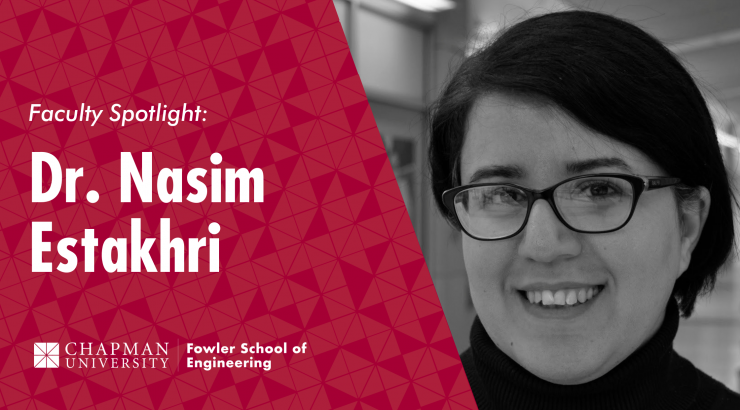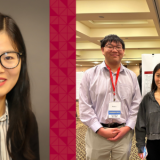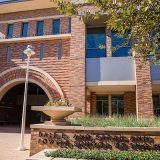
Chapman Engineering Faculty Augments Electrical Engineering Through Passion-Driven Research Faculty Spotlight: Dr. Nasim Estakhri
July 14, 2023
Faculty Name: Dr. Nasim Estakhri
Course(s) Taught: EENG 330: Electromagnetics I; EENG 310: Engineering Mathematics; ENGR 101: Foundations of Design and Fabrication; EENG 200/200L: Circuits

Dr. Estakhri was nominated and received the Unit Faculty Excellence Award from Fowler Engineering in May 2023. The Unit Faculty Awards recognize exceptional contributions in the areas of teaching and/or scholarly/creative activity and/or service to the university.
When it comes to complex and elaborate topics in electrical engineering, Dr. Nasim Estakhri is the main person of contact at the Fowler School of Engineering (FSE). Dr. Estakhri earned her bachelor’s and master’s degrees in Electrical Engineering from University of Tehran, Iran and a Ph.D. in the same subject at the University of Texas at Austin. She then moved on to become a postdoctoral researcher in the Department of Electrical and Systems Engineering at the University of Pennsylvania.
Throughout her time at Chapman, Dr. Estakhri has enriched and continued her passion for Electrical Engineering, teaching Electromagnetics, Engineering Mathematics, Foundations of Design and Fabrication, and Circuits at FSE. She has also conducted research in nano-photonics, metamaterials, nano-optics, and applied electromagnetics. While Dr. Estakhri has and is continuing to pave the way of innovative research in engineering, she wishes to possibly teach courses that hone in on her research—more specifically, photonics.
We asked Dr. Estakhri about her research and time at FSE along with her many accomplishments in the field.
Q&A With Dr. Nasim Estakhri
Q: What are you currently focusing on with your research group?
Dr. Estakhri: My research group works in the broad area of metamaterials and metasurfaces, aiming at understanding and controlling different aspects of wave

Dr. Estakhri presenting her work on Optical Computing, which was published in Science and patented during her postdoc at the University of Pennsylvania (UPenn).
interaction with engineered nanostructures. The main idea is to create artificial materials and surfaces that mold the scattering and propagation of waves in nontrivial ways. We use these effects to design meta-structures that boost current technological capabilities in terms of size, speed, power consumption, and sensitivity for various devices with a broad range of applications in the photonics field. Some of our recent areas of work include:
- Using deep learning to design metasurfaces that can efficiently trap sub-100 nm particles
- Ultracompact metasurface interferometers
- Metasurface near-field plates
- Self-thermoregulators based on phase-change metasurfaces
- Boosting antenna reception using designer metasurface coatings
- Machine learning design of plasmonic nanoparticles
Q: What is your favorite part of teaching at Fowler School of Engineering?
Dr. Estakhri: I find teaching very intriguing: I see it as a collective effort between the instructor and students to accomplish certain educational goals. My favorite part of this process is to create the right environment for students to be able to explore their capabilities and challenge themselves toward independent thinking.

During her time as a Ph.D. student, Estakhri explored more of Electrical Engineering at the University of Texas, Austin.
Q: How have you incorporated your industry knowledge and/or research into your teaching?
Dr. Estakhri: A lot of the physical phenomena around us are based on the interaction of electromagnetic waves and materials, which is the subject of my research. While the mathematical descriptions of these phenomena can be complex, the intuitive picture is very useful for teaching. When talking about circuits, electromagnetic radiation, or even abstract mathematical concepts, I include examples from these physical phenomena and discuss how it is linked to my research.
Q: What have you noticed about Fowler School of Engineering students that impresses you?
Dr. Estakhri: At Fowler, I work with several undergraduate students on advanced research projects, working on coding, modeling, and experimental testing. These kinds of projects are typically given to graduate students, and I have been very impressed by how open the students are to learning new material as well as their commitment and hard work. There is a lot of positive energy and the right attitude toward learning and growing in the community.
Q: What is the best piece of advice you have received?
Dr. Estakhri: One of the best pieces of advice that I have been given was to dedicate some time to understanding my passion in research— specifically, to not confuse the research that I am very good at (or that is easy to do) with what I will enjoy working on in the long term.
To read more about her research and stay updated about her recent accomplishments, visit her research website and connect with her on LinkedIn!

